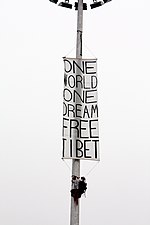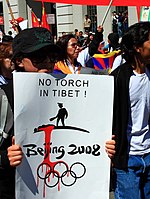Colonialism and the Olympic Games
[citation needed] The founder of the modern Olympic Games, French educator Pierre de Coubertin wrote that sport and colonialism were "natural companions".
[6] Since the 1889 Paris Exposition, human zoos, as a key feature of world's fairs, functioned as demonstrations of anthropological notions of race, progress, and civilization.
[14] Additionally, almost all of the 400 athletic events were referred to as "Olympian,"[14] and the opening ceremony was held in May[15] with dignitaries in attendance, though the official Olympic program did not begin until July 1.
Contests included "baseball throwing, shot put, running, broad jumping, weight lifting, pole climbing, and tugs-of-war before a crowd of approximately ten thousand".
[19] She is referring to then Prime Minister Pierre Trudeau's 1969 Statement of the Government of Canada on Indian Policy (also called the White Paper), which was perceived by some Canadian indigenous people as a further attempt at assimilation.
[20] O'Bonsawin describes how amid these tensions the Montreal Olympic Games' closing ceremony employed indigenous symbolism without consultation with local First Nations.
[26] While corporations extracted resources from their lands, the Lubicon Cree were experiencing "a 93% decline in their annual trapping income, high rates of alcoholism, a tuberculosis crisis, and malnourishment in the community".
[27] The Lubicon Cree focused their boycott on a specific Olympic event: The Spirit Sings exhibit at the Glenbow Museum, part of the official cultural programming of the Games.
[31] The discourse generated by the Lubicon boycott of The Spirit Sings resulted in the formation of a task force that eventually released a ground-breaking report that continues to influence how museum professionals approach working with indigenous communities.
[32] In addition to the boycott of The Spirit Sings, the torch relay run was targeted by protesters for its sponsorship by Petro-Canada, which was "invading indigenous territories (including Lubicon lands) across Canada".
[37] The international journalist group Reporters Without Borders (RSF) advocated boycott to express concerns over violations of free speech and human rights in China.
It hoped that international pressure could effect the release of prisoners of conscience and the upholding of promises made to the IOC regarding improvements in human rights.
[38] In March 2008, Taiwan's president-elect Ma Ying-jeou threatened a Chinese Taipei Olympic Committee boycott "if the situation in Tibet continues to worsen".
[41] During the Olympic torch lighting ceremony in Greece on 24 March 2008, three Reporters Without Borders journalists breached a cordon of 1,000 police at the ancient Olympia stadium and interrupted the speech of Liu Qi, head of the Beijing Games committee.
[citation needed] Nearly 50 Tibetan exiles in India began a global torch relay 25 March 2008 with a symbolic "Olympic" flame that ended in Tibet on 8 August 2008, the day of the Summer Games' opening ceremonies in Beijing.
In late April, Chinese Internet censors, who had previously permitted posts critical of non-Chinese, began blocking words such as "Carrefour", in what was seen as an attempt to calm tensions before the games.
[47] In 2008, the Chinese government announced that several terrorist plots by Uyghur separatists to disrupt the 2008 Olympic Games involving kidnapping athletes, journalists and tourists were foiled.
[54] Composed of representatives from the Lil'wat, Musqueam, Squamish, and Tsleil-Waututh First Nations from the Vancouver and Whistler areas, the FHFN was created to ensure that "their cultures and traditions are respected and showcased throughout the planning, staging, and hosting of the 2010 Winter Games".
[57] Calling the FHFN a "cheap and shallow scheme",[57] he points out that in 2007 Canada was one of only four countries to vote against the adoption of the United Nations Declaration on the Rights of Indigenous Peoples.
"[61] The business referred to includes massive real estate developments as explained in a Dominion article: Vast areas of unceded land that Indigenous communities depend on for hunting, fishing and general survival are at risk.
Hundreds of millions of dollars have been spent to build new resorts and expand existing ones in order to attract and accommodate tourists, Olympic athletes and trainers.
[citation needed] Some Inuit, in criticizing the adoption of "Ilanaaq", explicitly made the connection between cultural appropriation and commodificaton, "arguing that it dishonoured the traditional functions of inuksuk and risked turning them into commodities that could be sold for tourist consumption".
In The Korea Times, Jung Min-ho called the comment "incorrect and insensitive," writing that "Tens of thousands of Koreans and non-Koreans alike have criticized Ramo and NBC Sports on their social media, urging them to correct this misinformation and apologize."
Maria Zakharova, spokeswoman of the Russian Ministry of Foreign Affairs, described the inclusion as "illegal", and accused the Tokyo Organising Committee of "politicising" the Games.
[97][98] The Japanese government's refusal to ban the controversial Rising Sun Flag in the Olympic sites has been criticized as going against the Olympic spirit, as the flag is offensive to East and Southeast Asian peoples due to its historical usage by the Imperial Japanese military during World War II, as well as its current usage by racist hate groups in Japan, such as Zaitokukai.
[99][100][101][102] The flag, often compared to Nazi swastika, is associated with war crimes and atrocities committed under the Japanese Empire, as well as contemporary Japan's far-right nationalist attempts to revise, deny, and romanticise its imperialistic past.






